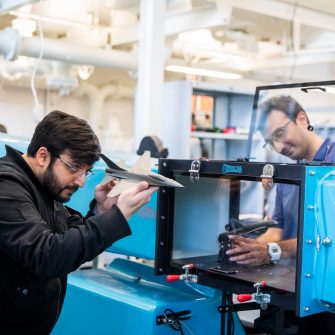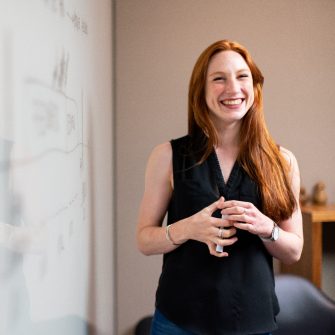Bachelor of Science (Computer Science) / Fine Arts
- Commencing Terms
- Term 1, 2 & 3
- Duration
- 4 Year(s)
- Delivery Mode
- Face-to-face (includes blended)
- Campus
-
Kensington
- Codes
- UAC code 425810
- Program code 3792
-
2025 Indicative first year full fee
- $8,000*
-
2025 Indicative full fee to complete degree
- $36,500*
-
2025 Indicative first year full fee
- $55,000*
-
2025 Indicative first year full fee
- $234,500*

- Overview
- Entry requirements
- What will I study?
- Future careers
- How to apply
- Fees & Scholarships
Overview
The Bachelor of Computer Science/Fine Arts double degree provides technical and creative foundations for developing and using computer graphics and coded media. It allows you to specialise in either the technical or creative strand of computer graphics and associated fields.
Designed for students aspiring to work in the creative fields, the Bachelor of Fine Arts (BFA) is for those who are open minded, curious, and inventive and who wish to immerse themselves in their creative practice. The BFA is home to distinctive specialisations in Animation and Moving Image, Art Theory, Music, and Visual Arts, each of which is led by experts in your field and supported by specialist facilities.
You'll build technical skills and knowledge, learning from experts in practical and theoretical classes. And with strong industry connections embedded in each specialisation, you'll develop your career throughout the entire degree.
Key features
Australia's leading engineering faculty
The Computer Science and Engineering School is part of the Faculty of Engineering, which is ranked #1 in Australia and #25 globally for Engineering and Technology. We're also ranked #4 in Australia for Computer Science. All eight of UNSW's Engineering schools are ranked in the global top 50 with two schools ranked in the global top 10 for Engineering subjects (QS World University Rankings by Subject, 2025).
Self-discovery
Explore and develop your artistic voice within your specialisation and take advantage of opportunities to experience a variety of creative disciplines. You'll enjoy hands-on practices in a comprehensive, intellectual, and artistic program.
World-class scholarship
UNSW’s School of Computer Science and Engineering research is ranked #1 in Australia for Algorithms, Artificial Intelligence, Databases, Embedded & Real-Time Systems and Operating Systems by CS Rankings. Our strong focus on research, with our world-class research facilities, feeds leading-edge discoveries straight into our degrees. Our research culture provides an education where you’ll question, test, learn and experiment, making discoveries along the way.
Collaborate with purpose
Bring an open mind to our social campus culture – meet and work alongside artists who are changing the way we think about important issues. Find out how creative practice is a cultural force that can raise awareness and drive action.
Real industry experience
Both programs connect you with industry and offer professional development experiences unique to your passions and goals, so you’ll shape your career from the outset of your degree.
ChallENG Program
This unique program, opens in a new window connects students, academics and industry to exciting, real-world, project-based learning initiatives. The program will prepare you for your future career by helping you develop technical and design skills and expanding your professional expertise.
Become of Australia's most employable graduates
UNSW is known for its graduate employability, with UNSW awarded the Most Employable students for six years in a row (Australian Financial Review (AFR) Top100 Future Leaders Awards, 2020-2025).
Why study this degree at UNSW?
Study at the #1 Engineering faculty in Australia
State-of-the-art creative production and computer science facilities
Showcase works in our galleries, publications, and events
Adobe Creative Cloud subscription while studying
Professional development with industry partners
A supportive, diverse, and inclusive community
Access to world-class alumni connections
Want to see more from UNSW Engineering?
Entry requirements
Assumed knowledge
Mathematics Extension 1
Additional selection criteria
Please note that acceptance into the Music specialisation requires you to audition. For more information, visit UNSW Music auditions, opens in a new window.
Portfolio Entry
This degree is eligible for admission through our Portfolio Entry Early Conditional Offer Scheme. Complete a submission to demonstrate your passion and performance in relevant subjects. Successful applicants will receive an early conditional offer with an adjusted ATAR entry requirement.
Adjustment Factors
We offer a range of adjustment factor schemes that reward students for academic performance and extra-curricular achievements. These schemes also take into account a range of personal and educational disadvantages that may have affected your studies.
HSC Plus
This scheme rewards students who perform well in Year 12 subjects that are relevant to their preferred UNSW degree. You may be awarded up to five points.
Elite Athletes, Performers and Leaders (EAPL)
This program recognises achievements in the areas of sport, academia, leadership and music at an elite level. You may be eligible for up to five points.
Educational Access Scheme (EAS), opens in a new window
Factors such as illness, financial hardship, language difficulties or attending a particular school can mean you don't always get the best possible marks in Years 11 and 12. If one of these situations applies to you, submit an application for the Educational Access Scheme (EAS) via UAC. Eligible students can receive between 1 and 10 points towards their chosen UNSW degree.
Admission pathways
The Faculty of Engineering Admission Scheme (FEAS) is a possible alternative admission pathway for the admission of domestic undergraduate students to UNSW Faculty of Engineering degree programs, including the BSc Computer Science and the BSc Food Science (Hons), who do not meet the published Guaranteed Entry selection rank. Visit the FEAS page, opens in a new window for more information.
English language requirements
You may be asked to provide evidence of your English proficiency to study at UNSW depending on your educational background and citizenship. English language skills are vitally important for coping with lectures, tutorials, assignments and examinations - this is why UNSW requires a minimum English language competency for enrolment.
If you’re completing an Australian Year 12 qualification (e.g. NSW HSC or equivalent), you do not need to provide anything extra to prove your proficiency. Your qualification will be used as evidence of your English proficiency.
If you do need to provide evidence of your English proficiency, this will be indicated in your application. You can prove this by providing evidence that you meet one or more of the following criteria:
- English language tests and university English courses
- Prior study in the medium of English
- Other qualifications
If you need to improve your English skills before you start your degree, UNSW College’s Academic English Programs are for you. The programs are suitable for various English levels and help you prepare for university studies and life in Australia.
For more details, visit the English Language Requirements page.
International direct entry
| Qualifications | Direct entry requirement |
|---|---|
|
International ATAR
|
85.0
|
| UNSW Foundation Studies GPA |
7.5
|
|
Great Britain General Certificate of Education (GCE A levels)
|
11.0
|
|
International Baccalaureate Diploma (IB)
|
32.0
|
|
Scholastic Aptitude Test (SAT) (after 2016)
|
1210.0
|
We do not accept secondary qualifications from this country. We may accept tertiary study results, please contact us for more information.
Please contact us for direct entry requirements.
Additional selection criteria
Please note that acceptance into the Music specialisation requires you to audition. For more information, visit UNSW Music auditions, opens in a new window.
Admission pathways
If you do not meet the requirements for direct entry into your chosen degree, you may be eligible for a pathway program with UNSW College. UNSW College provides alternative entry options using university-approved content so that you can start your UNSW journey with confidence.
English language requirements
You may be asked to provide evidence of your English proficiency to study at UNSW depending on whether you are from an English-speaking background or non-English speaking background. English language skills are vitally important for coping with lectures, tutorials, assignments and examinations - this is why UNSW requires a minimum English language competency for enrolment.
If English is not your first language, you’ll need to provide proof of your English proficiency before you can be given an offer to study at UNSW. You can do this by providing evidence that you meet one or more of the following criteria:
- English language tests and university English courses
- Prior study in the medium of English
- Other qualifications
If you need to improve your English skills before you start your degree, UNSW College’s Academic English Programs are for you. The programs are suitable for various English levels and help you prepare for university studies and life in Australia.
For more details, visit the English Language Requirements page.
Check the specific English language requirements for this program
Program structure
The Bachelor of Science (Computer Science)/Fine Arts double degree program is 4 years full-time and consists of 32 courses (192 Units of Credit). Even though you’ll complete two degrees, it doesn’t mean double the workload. Each year you’ll complete a mix of courses from each degree with the same number of units as a single degree full-time study load of eight courses across three terms.
This double degree program includes:
Core courses in computer science and fine arts
Fine arts specialisation
Optional computer science specialisation
Elective courses
Once you complete a bachelor’s degree, you’ll be eligible to apply for further study at a postgraduate level. If you’d like further information about this degree and its learning outcomes have a look at our student handbook, opens in a new window.
Future careers
Throughout your double degree, you’ll build a network of contacts among your classmates and lecturers, and you’ll be able to reach out to a global network of UNSW graduates. When launching your career, you'll benefit from our leading reputation in research and teaching, with many graduates recruited by industry partners before completing their degree.
Our computer science graduates have gone on to work with companies such as CSIRO, Cisco, Microsoft, Google, Amazon and start-ups like Canva and Atlassian. With flexible course options, your Bachelor of Fine Arts includes opportunities to experiment with professional roles in internships and work placements, preparing you for your career.
Your career opportunities may depend on your area of specialisation. View the various degree specialisations for examples of specific career opportunities below.
Accreditation
Australian Computer Society
How to apply
Applications for undergraduate study from domestic students (Australian citizens, Australian permanent residents, Australian permanent humanitarian visa holders and New Zealand citizens) are processed by the Universities Admissions Centre (UAC).
Visit the Apply section of the UAC website, opens in a new window and you can nominate up to five degrees in order of preference, with the first being your most desired degree and university.
On-time applications for admission usually close at the end of September each year for Term 1 admission. Late applications can be submitted, but a late fee will apply. For study starting in Term 1, the majority of offers are made in December and January. Visit the UAC website, opens in a new window for key dates for admission outside of Term 1.
Ready to start your application?
For most international students, applications are submitted via our Apply Online service. We encourage you to submit your completed application as early as possible to ensure it will be processed in time for your preferred term.
Some high-demand programs with limited places, may have an earlier application deadline or may have an earlier commencement date. For more information visit our international applicant information page.
*If you are an international student studying an Australian qualification, go to the Universities Admission Centre (UAC), opens in a new window for application and UAC key dates. Note: If you are under 18 years of age, you need to make special arrangements. Read more.
Ready to start your application?
Fees & Scholarships
Commonwealth Supported Place multiple Student Contribution Bands may apply for this double degree. See single degrees for the applicable fee bands.*The student contribution for a Commonwealth Supported Place is an indication only of the amount payable in Year 1 based on a standard full-time load of 48 credit points (1.0 EFTSL). The actual student contribution you will be liable for depends on your individual program of study and the calendar year in which you enrol. Actual fees are calculated upon enrolment. Student contribution amounts are subject to annual review by the University and may increase each year during your studies (subject to caps determined by the Australian Government), effective at the start of each calendar year. The indicative fees listed here are based on an estimated average and are for tuition only other fees and charges are not included.
*Fees are subject to annual review by the University and may increase annually, with the new fees effective from the start of each calendar year. The indicative fees listed here are based on an estimated average and are for tuition only, other fees and charges are not included. The amount you pay will vary depending on the calendar year to enrol, the courses you select and whether your study load is more or less than 1 Equivalent Full Time Student Load (8 courses per year).
Indicative fees are a guide for comparison only based on current conditions and available data. You should not rely on indicative fees. More information on fees can be found at the UNSW fees website.
Indicative fees to complete the program have been calculated based on a percentage increase for every year of the program. Fee increases are assessed annually and may exceed the indicative figures listed here.
Indicative fees to complete the program include tuition plus an estimate of study-related costs of approximately $1,000 per year. To find out more about other costs, visit UNSW International.
Scholarships
At UNSW, we award over $83 million in scholarships each year. We pride ourselves on rewarding excellence and making university accessible to students from all walks of life. Whether you’re a domestic or international student, our range of scholarships, prizes and awards can support your journey.

QS World University Rankings, 2025

AFR Top100 Future Leaders Awards, 2020-2025

#1 Australian uni attended by start-up founders





